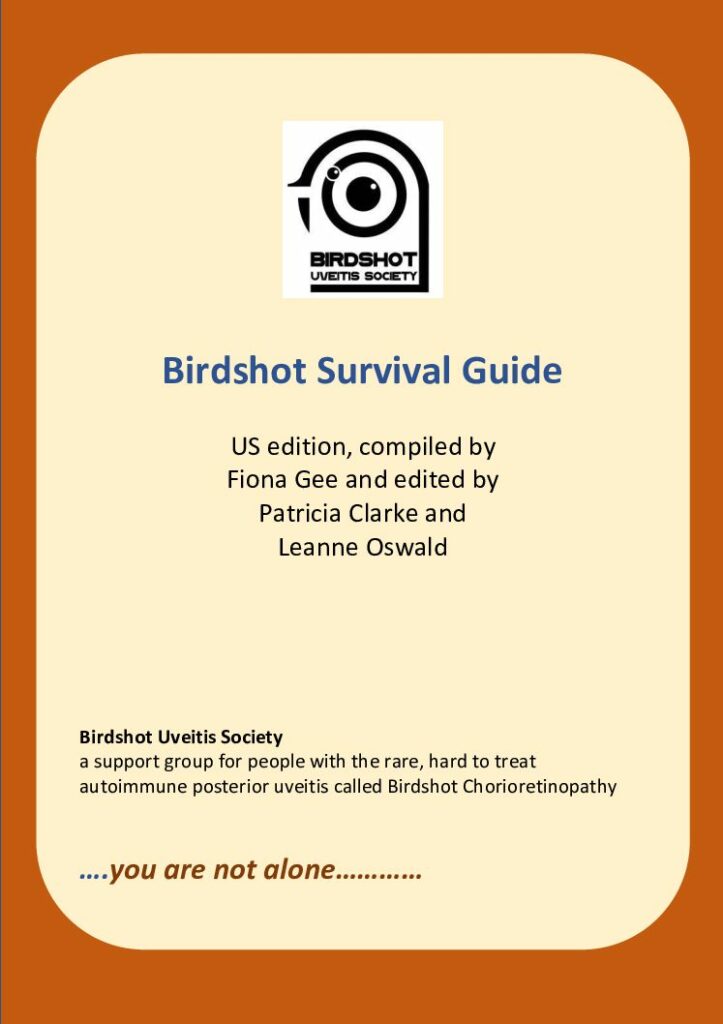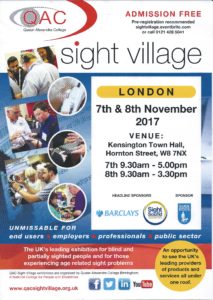Birdshot Uveitis Society and Fight for Sight have co-funded a number of small grants for birdshot research. Here are video updates from the recipients of five of these projects. They were all asked to make sure that their talk was no longer than 10 minutes, with an additional five minutes for questions. Further project descriptions can be found at the following link. https://birdshot.org.uk/funded-birdshot-uveitis-research-projects/
Colin Chu -‘Investigating Birdshot using human induced pluripotent stem cell modelling’
https://vimeo.com/327024591
Alastair Denniston – ‘Update of the Birdshot database and biobank’
https://vimeo.com/327016934
Omar Mahroo – ‘Update on the RETeval device’
https://vimeo.com/327043191
Philip Murray – ‘Health Utility’
https://vimeo.com/327068379
Graham Wallace – ‘Update on iron overload’
https://vimeo.com/327028545
Mark Westcott – ‘BOSU Study – How many new cases of birdshot each year?’
https://vimeo.com/327039177
Further brief details about the speakers
Colin Chu PhD, FRCOphth, MA, BM, BCh, is a National Institute for Health Research (NIHR) Academic Clinical Lecturer at the University of Bristol and Bristol Eye Hospital, working with Professor Andrew Dick on gene therapy and ocular inflammation (uveitis). During ophthalmology specialist training he was awarded a Medical Research Council (MRC) and Fight for Sight Clinical Research Training Fellowship, gaining his PhD with Professor Robin Ali at UCL Institute of Ophthalmology. He has previously undertaken research at the MRC Laboratory of Molecular Biology in Cambridge, the Weatherall Institute of Molecular Medicine in Oxford and at the Save Sight Institute in Sydney.
Professor Alastair Denniston, MA, MBBChir, MRCP, FRCOphth, PhD, is Consultant Ophthalmologist (Uveitis and Medical Retina) at University Hospitals Birmingham NHS Foundation Trust and Honorary Reader at the University of Birmingham, UK. Alongside Prof Philip Murray, he leads the Birmingham Regional Birdshot Uveitis Clinic which is utilising novel means of imaging to try to improve detection of active disease. He also leads on the development of the National Birdshot Biobank and the Birdshot Registry (database) with Charlotte Radovanovic, Birdshot database project manager. He was awarded an MRC Clinical Research Training Fellowship in 2006, and completed his PhD in Ocular Immunity in 2009. He regularly publishes research papers in scientific journals and is active in research related to birdshot, with a particular emphasis on improving our ability to monitor the activity of birdshot and other forms of uveitis. To further this work, he established the EQUATOR consortium (www.equator.vision) in 2013 with Mr Pearse Keane. Alastair is keen to promote public awareness and patient engagement with ophthalmic research and has been actively involved with the Medical Research Council (MRC) Max Perutz Science Writing Prize and the British Science Festival.
Omar Mahroo MA, MBBChir, PhD, FRCOphth, FHEA, is a consultant ophthalmologist with subspecialty expertise in retinal disease, managing patients at Moorfields Eye Hospital and St Thomas’ Hospital. He completed a medical degree and PhD at the University of Cambridge, and post-doctoral research at Cambridge and the Australian National University. He then commenced clinical house officer jobs in Cambridge, followed by ophthalmology training in London. His main research interest is understanding retinal function through electrophysiology. He has received funding from Fight for Sight, the Birdshot Uveitis Society, National Institute for Health Research (NIHR) and Thomas Pocklington Trust. He was recently awarded a £1.1m Wellcome Trust Clinical Research Career Development Fellowship to investigate disease mechanisms in patients with inherited retinal conditions and also the effects of common genetic variants on retinal function in healthy individuals, including variants related to myopia. His research is based at the UCL Institute of Ophthalmology and at King’s College, London where he is Honorary Senior Lecturer. He has been trialling the use of a quick-to-use hand-held electrophysiology device that could help manage patients in clinic.
Professor Philip I Murray MBBS, DO(RCS), PhD, FRCP, FRCS, FRCOphth, undertook most of his clinical ophthalmology training at Moorfields Eye Hospital, London and his basic science laboratory training at the Institute of Ophthalmology, London and the Department of Ophthalmo- Immunology, Amsterdam. He is Professor of Ophthalmology, Institute of Inflammation and Ageing, University of Birmingham. His laboratory research is focussed on understanding:
• why intraocular tolerance fails in uveitis
• what immune mechanisms initiate and drive the inflammatory response
• what can one do about it?
He is Honorary Consultant Ophthalmologist at the Birmingham and Midland Eye Centre (BMEC), Sandwell and West Birmingham Hospitals NHS Trust and runs two dedicated regional and supra-regional uveitis clinics per week. He enjoys the challenging and frustrating nature of uveitis but also finds it immensely rewarding. He is involved in clinical trials on novel therapies for uveitis and until recently he had a special interest in cataract surgery on the uveitic eye. He is part of the Birmingham National Centre of Excellence for Behçet’s syndrome. From 2004-2016 he was Secretary of the International Uveitis Study Group. He sits on numerous national committees, is section editor for three journals, an examiner for the Royal College of Ophthalmologists (RCOphth), external examiner for the Royal College of Surgeons of Ireland and past external examiner, Optometry BSc (Hons), Aston University.
Graham Wallace, BSc, PhD, is a Senior Lecturer in the School of Immunity and Infection, Birmingham University. He has published over 75 research papers in scientific journals as well as reviews in the fields of ocular immunology, Behҫet’s syndrome and immunogenetics. He has received grants from Guide Dogs for the Blind Association, Fight for Sight, and the Wellcome Trust. He is an enthusiastic communicator on the theme of immune responses in the eye and the effects of gene polymorphisms on ocular diseases. Graham is on the medical panel of the Behҫet’s Syndrome Society and speaks at meetings of patient groups on a regular basis.
Mark Westcott MD, FRCOphth, CCST, is a Consultant Ophthalmologist at Moorfields Eye Hospital, London, where he specialises in uveitis, and also at St Bartholomew’s and The Royal London Hospitals. After residency training in London he spent a Fellowship year in glaucoma at the UCLA Stein Eye Institute, Los Angeles. Thereafter he returned to Moorfields Eye Hospital to undertake a Specialist Fellowship in medical retina and inflammatory eye disease.
Mark has co-authored over 40 scientific papers and regularly lectures both nationally and internationally. He is an honorary Senior Lecturer at the Institute of Ophthalmology, UCL. His research interests include infectious uveitis, birdshot disease and visual dysfunction in glaucoma.
Next session (6)

